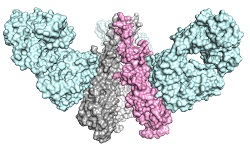 |
| Researchers designed a molecule that mimicked the shape of a key part of the influenza virus.--Courtesy of The Scripps Research Institute |
The NIAID may have posted 94% efficacy in mice for its investigational "universal" flu vaccine, but The Scripps Research Institute and partner Johnson & Johnson ($JNJ) are hot on its heels. Scripps announced Monday that its most advanced candidate fully protected mice in a lethal challenge. They also conducted a sublethal challenge, where the vaccine reduced fever in monkeys.
"These tests showed that antibodies elicited against one influenza subtype could protect against a different subtype," said Ian Wilson, Hansen Professor of Structural Biology and chair of the Department of Integrative Structural and Computational Biology at Scripps, in the statement.
A "universal" flu shot--or one that protects against a range of flu viruses--would eliminate the need to create seasonal flu vaccines each year. It would also address a weakness of the current flu vaccine model: strain drift, which occurs when the flu strains that actually circulate differ from the strains that health experts predicted would be most prevalent.
Inspired by certain people who make "broadly neutralizing antibodies," or bnAbs, that can fight many subtypes of flu at once, Scripps and Janssen researchers focused on designing a vaccine that would specifically elicit such antibodies. BnAbs work by targeting a site on the influenza virus that does not mutate rapidly, Scripps said in a statement.
The researchers focused on hemagglutinin (HA), a surface protein present on all flu virus subtypes. They created an immunogen that mimics the structure of HA with the goal of teaching "the body to make powerful antibodies against influenza virus, priming it to fight off a variety of flu strains," Scripps said in the statement.
"If the body can make an immune response against the HA stem (the part that connects the virus to cells), it's difficult for the virus to escape," Wilson said.
And while these results are just proof-of-concept and much work remains before it can be shown to succeed in humans, they represent an encouraging step toward the goal of a life-long universal flu vaccine.
- here's the release
- read the abstract